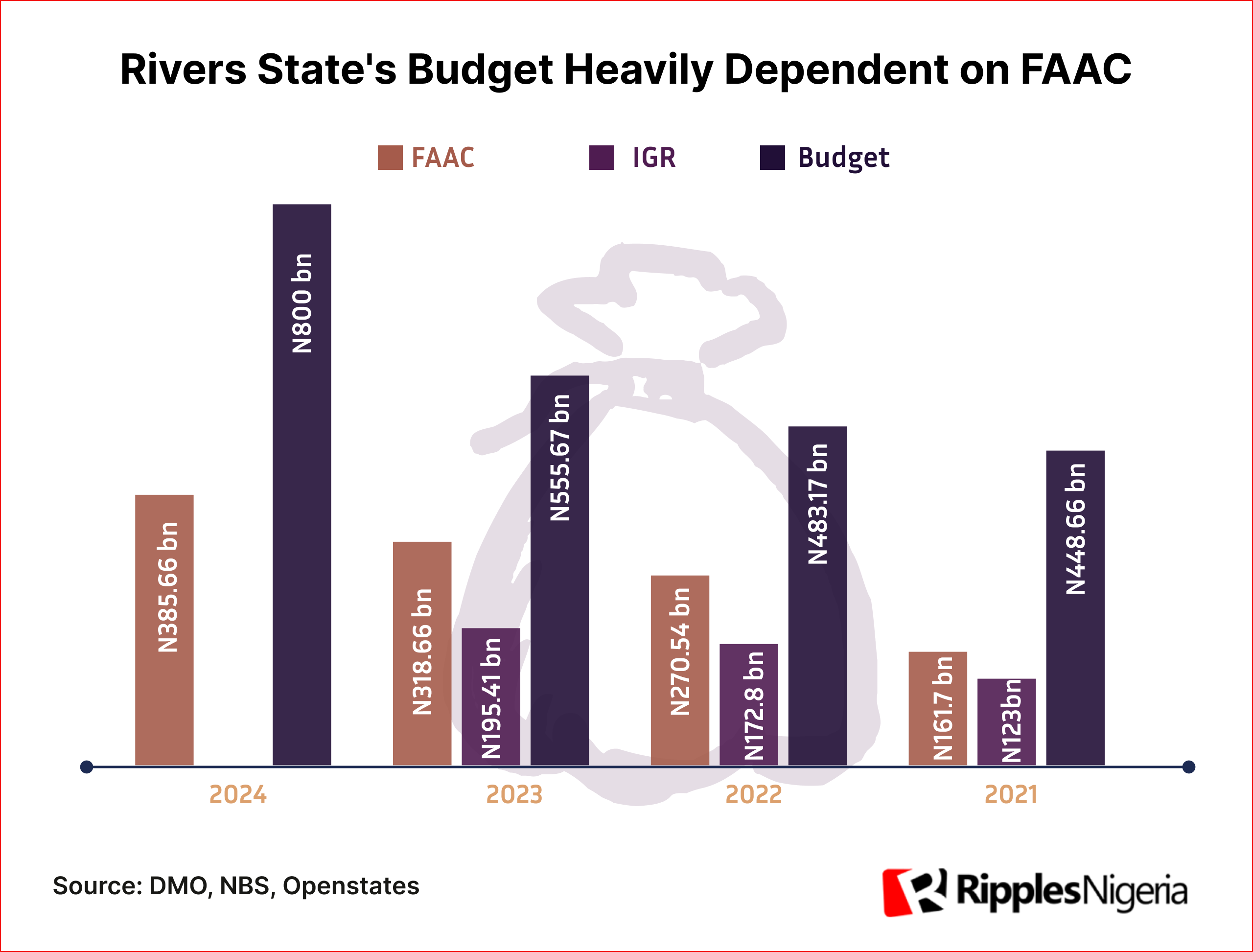Ripples Metrics
RipplesMetrics: In Rivers, reliance on FAAC drives budget preparation than IGR (Part 2)

Among the crises rocking the Siminalayi Fubara’s administration has been the presentation of the budget, a financial appropriation that drives the spending of the government within a fiscal year. The budget presentation is prepared by the executive and presented to the legislature to debate before it is signed into law.
However, in the last two years, the cycle of presentation has not been smooth, especially with the decamping and confrontations between both arms of the government. For instance, the governor signed the N800 billion 2024 budget into law, barely 24 hours after it was presented to a four-man House of Assembly for approval following the contentions between the governor and the 27 lawmakers in the court.
In 2025, the same gesture was repeated with the governor presenting N1.88 trillion to a three-man legislative team.
This report looks into the socioeconomic data of budget, federal allocation and revenue generation over the years in Rivers State.
Financial dependency
Recent budgetary data reinforce Rivers State’s financial dependence on federal allocations. The data reveal that internally generated revenue (IGR) has struggled to keep pace with the state’s growing expenditure needs. The figures highlight a significant reliance on Federal Accounts Allocation Committee (FAAC) disbursements to fund the state’s budget over the years.
According to financial data, Rivers State’s budget has seen a sharp rise from N448.66 billion in 2021 to a record N800 billion in 2024. However, while the budget has nearly doubled, IGR has not experienced similar growth. In 2023, for instance, the state had an IGR of N195.41 billion, while FAAC allocations stood at N318.66 billion—demonstrating that the state relied heavily on federal funding to meet its budgetary obligations.
READ ALSO: RIVERS: Ibas ignores court order, appoints administrators for 23 LGAs
FAAC; the dominant revenue
The trend of high FAAC dependence is evident across recent years. In 2024, Rivers State received N385.66 billion from FAAC, yet its IGR figures remain undisclosed. Given the state’s past revenue patterns, it is clear that internal revenue alone would not be sufficient to fund even half of the state’s expenditure.
In 2022, Rivers State’s FAAC allocation stood at N270.54 billion, with an IGR of N172.82 billion. While this shows some level of internal revenue effort, the gap between FAAC and IGR remains considerable.
Despite being a key commercial hub in the Niger Delta, Rivers State’s internal revenue streams have failed to grow in tandem with its budgetary demands. The stagnation in IGR points to structural challenges, including low business taxation efficiency, limited investment in non-oil sectors, and an over-reliance on federal funds.
While FAAC allocations provide a short-term buffer, they are not a sustainable means of economic growth. Global oil price fluctuations and changing federal revenue-sharing formulas could pose long-term risks to Rivers State’s financial stability.
For instance, in 2023 when Fubara came into power, the domestic debt of the state was N225.5 billion and an external debt of $87.1 million in 2022. As of the latest data from the Debt Management Office, the external debt had dropped to $83.96 million while the domestic debt had not been updated.
Rivers State’s budget expansion over the years has not been matched by a proportional increase in internally generated revenue, highlighting the urgent need for fiscal reforms. The current trend of FAAC dependency is unsustainable in the long run, and the state government must prioritize policies that promote economic self-sufficiency and long-term financial stability.
By: James Odunayo
Join the conversation
Support Ripples Nigeria, hold up solutions journalism
Balanced, fearless journalism driven by data comes at huge financial costs.
As a media platform, we hold leadership accountable and will not trade the right to press freedom and free speech for a piece of cake.
If you like what we do, and are ready to uphold solutions journalism, kindly donate to the Ripples Nigeria cause.
Your support would help to ensure that citizens and institutions continue to have free access to credible and reliable information for societal development.




























